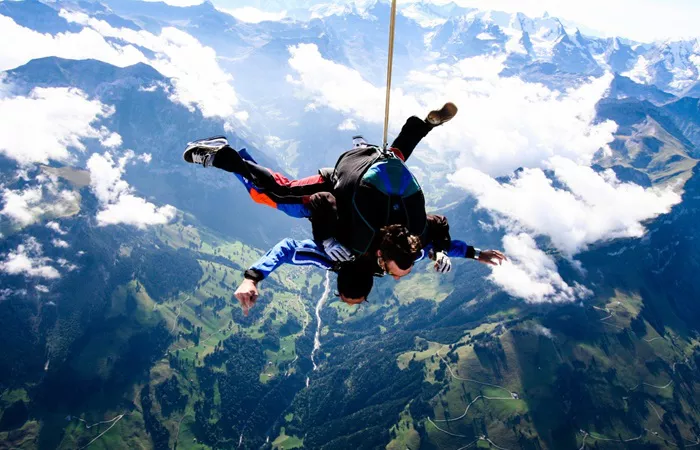Skydiving is often seen as the ultimate adrenaline rush, a once-in-a-lifetime experience for many. But for those who take to the skies regularly, the long-term effects of skydiving can be profound and multifaceted. This article delves into the lasting impacts—both physical and psychological—of this exhilarating sport.
Physical Health Impacts
Musculoskeletal System
Skydiving, especially frequent jumps, can put significant stress on the body. The impact of landing, even with proper techniques, can affect the musculoskeletal system over time. Jumpers often experience:
Joint Strain: Knees, ankles, and hips bear the brunt of landings, which can lead to chronic pain or arthritis.
Back Issues: The spine absorbs considerable shock during both freefall and landing, potentially leading to long-term back problems.
Muscle Fatigue: Regular skydivers may develop muscle fatigue from the physical demands of maintaining body position and controlling parachute descents.
Cardiovascular Health
Skydiving is a cardiovascular workout, albeit in short, intense bursts. Over time, this can have both positive and negative effects:
Improved Cardio Fitness: The adrenaline rush and physical exertion can improve overall cardiovascular health.
Increased Stress on the Heart: The adrenaline spikes can also increase stress on the heart, particularly for those with pre-existing conditions.
Respiratory System
The high altitudes and rapid descents in skydiving can impact the respiratory system:
Oxygen Deprivation: At high altitudes, the air is thinner, and prolonged exposure can lead to hypoxia, affecting long-term lung function.
Improved Lung Capacity: Regular skydivers may develop better lung capacity and efficiency due to frequent exposure to varying air pressures.
Psychological Effects
Mental Health Benefits
Skydiving is often touted for its psychological benefits, contributing to improved mental health in several ways:
Stress Relief: The adrenaline rush and focus required can provide a significant stress release, akin to meditation or other mindfulness practices.
Confidence Boost: Successfully completing jumps can enhance self-confidence and a sense of accomplishment.
Mental Resilience: Facing and overcoming the inherent risks of skydiving can build mental toughness and resilience.
Cognitive Function
Engaging in skydiving can also have positive effects on cognitive function:
Enhanced Focus and Concentration: The need for precise control and quick decision-making can sharpen cognitive skills.
Improved Problem-Solving Abilities: Skydivers often need to think quickly and adapt to changing situations, enhancing their problem-solving capabilities.
Potential Negative Psychological Impacts
While skydiving can offer many mental health benefits, there are potential downsides:
Post-Traumatic Stress: Experiencing a malfunction or a near-miss incident can lead to PTSD-like symptoms in some individuals.
Adrenaline Addiction: The thrill of skydiving can become addictive, leading some to engage in riskier behaviors outside of the sport.
Social and Lifestyle Impacts
Community and Relationships
Skydiving fosters a strong sense of community and camaraderie among participants:
Bonding: Shared experiences and the trust required in skydiving create deep bonds among jumpers.
Support Networks: Skydivers often form supportive networks, providing emotional and practical support to one another.
Lifestyle Changes
Regular participation in skydiving can lead to significant lifestyle changes:
Travel and Adventure: Many skydivers travel extensively to jump at different locations, integrating a sense of adventure into their lifestyle.
Health and Fitness: Maintaining physical fitness becomes a priority for many skydivers, leading to healthier lifestyle choices overall.
Professional Implications
Career Opportunities
For some, skydiving transitions from a hobby to a profession:
Instructors and Coaches: Experienced skydivers can become instructors, sharing their passion and expertise with newcomers.
Competitive Skydiving: Some pursue competitive skydiving, participating in events and competitions globally.
Stunt Work: Skilled skydivers may find opportunities in stunt work for films and television.
see also: What To Avoid Before Skydiving?
Financial Considerations
Skydiving can be an expensive hobby, impacting financial stability:
Cost of Equipment: Quality skydiving gear is costly, and regular maintenance adds to the expense.
Travel and Fees: Traveling to different drop zones and paying for jumps can accumulate significant costs over time.
Long-Term Safety Considerations
Safety Equipment and Technology
Advancements in skydiving technology have improved safety, but long-term jumpers should be aware of:
Equipment Wear and Tear: Regular use can lead to equipment degradation, necessitating frequent inspections and replacements.
Technological Updates: Staying informed about the latest safety advancements and integrating them into practice is crucial for long-term safety.
Health Monitoring
Regular health check-ups are vital for long-term skydivers to monitor potential impacts:
Routine Physical Exams: Regular check-ups can identify and address any musculoskeletal or cardiovascular issues early.
Mental Health Assessments: Periodic mental health evaluations can help manage stress and other psychological impacts.
Conclusion: Balancing Passion and Health
Skydiving offers unparalleled thrills and numerous benefits, but it’s essential to balance passion with health and safety considerations. By understanding and addressing the long-term effects, skydivers can continue to enjoy the sport while maintaining their well-being. Regular monitoring, proper equipment maintenance, and mental health awareness are key to a sustainable skydiving journey.
related topics:
- Essential Gear And Tips To Start Your Rock Climbing Journey
- Forearm Pain After Rock Climbing: Causes, Prevention, And Recovery
- Exploring The Most Common Types Of Rock Climbing

